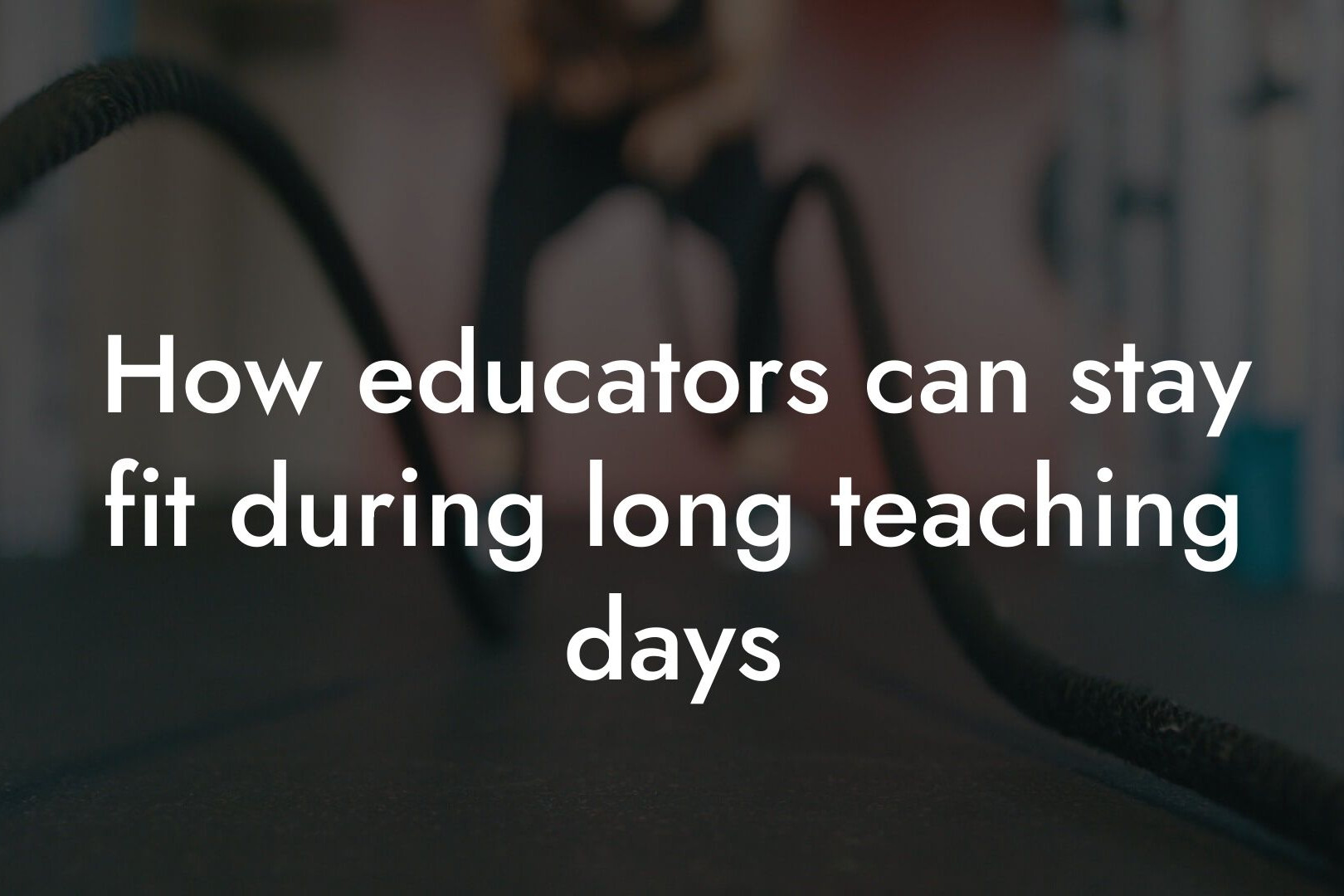As high-earning professionals, we understand the importance of maintaining a healthy physique and overall well-being. However, the impact of physical health extends beyond just personal appearance and can have a significant influence on various aspects of our lives, including our productivity, focus, and overall performance. One area that is often overlooked is the impact of physical health on student engagement. In this article, we will explore the intricate relationship between physical health and student engagement, and how it can affect academic performance.
Table of Contents
- The Importance of Student Engagement
- The Link Between Physical Health and Student Engagement
- The Role of Exercise in Student Engagement
- The Impact of Nutrition on Student Engagement
- The Effects of Sleep Deprivation on Student Engagement
- The Relationship Between Stress and Student Engagement
- The Role of Body Composition in Student Engagement
- Practical Strategies for Improving Student Engagement through Physical Health
- Frequently Asked Questions
The Importance of Student Engagement
Student engagement is a critical factor in academic success. It refers to the degree of attention, interest, and participation students exhibit in their learning experiences. Engaged students are more likely to be motivated, focused, and committed to their studies, leading to better academic outcomes. On the other hand, disengaged students may struggle with absenteeism, low motivation, and poor academic performance.
The Link Between Physical Health and Student Engagement
Research has consistently shown that there is a strong correlation between physical health and student engagement. Students who are physically healthy tend to be more engaged in their learning experiences. This is because physical health has a direct impact on cognitive function, mood, and energy levels. When students are physically healthy, they are more likely to have the mental and emotional resources needed to focus, learn, and participate in academic activities.
The Role of Exercise in Student Engagement
Exercise is a critical component of physical health, and it plays a significant role in student engagement. Regular exercise has been shown to improve cognitive function, boost mood, and increase energy levels. Exercise also promotes better sleep quality, which is essential for memory consolidation and learning. When students engage in regular physical activity, they are more likely to be focused, motivated, and engaged in their academic pursuits.
The Impact of Nutrition on Student Engagement
Nutrition is another essential aspect of physical health that affects student engagement. A well-balanced diet provides the necessary fuel for the brain and body, enabling students to focus, learn, and participate in academic activities. A diet rich in fruits, vegetables, whole grains, and lean proteins can improve cognitive function, mood, and energy levels. On the other hand, a diet high in processed foods, sugar, and unhealthy fats can lead to decreased motivation, focus, and engagement.
The Effects of Sleep Deprivation on Student Engagement
Sleep deprivation is a common issue among students, and it can have a significant impact on student engagement. When students do not get enough sleep, they may struggle with focus, motivation, and participation in academic activities. Sleep deprivation can also lead to decreased cognitive function, mood disturbances, and increased stress levels. Adequate sleep is essential for memory consolidation, learning, and overall physical and mental health.
The Relationship Between Stress and Student Engagement
Stress is a common experience among students, and it can have a significant impact on student engagement. Chronic stress can lead to decreased motivation, focus, and participation in academic activities. Stress can also affect physical health, leading to decreased immune function, digestive problems, and mood disturbances. When students are able to manage stress effectively, they are more likely to be engaged, motivated, and focused on their academic pursuits.
The Role of Body Composition in Student Engagement
Body composition, including body fat percentage, muscle mass, and bone density, can also impact student engagement. When students have a healthy body composition, they are more likely to have the energy, motivation, and focus needed to engage in academic activities. A healthy body composition can also improve overall physical and mental health, leading to better academic outcomes.
Practical Strategies for Improving Student Engagement through Physical Health
So, what can students do to improve their physical health and, in turn, their student engagement? Here are some practical strategies:
• Engage in regular physical activity, such as exercise or sports, to improve cognitive function, mood, and energy levels.
• Eat a well-balanced diet rich in fruits, vegetables, whole grains, and lean proteins to provide the necessary fuel for the brain and body.
• Prioritize sleep and aim for 7-9 hours of sleep per night to improve focus, motivation, and overall physical and mental health.
• Practice stress-reducing techniques, such as meditation or deep breathing, to manage stress and improve overall well-being.
• Monitor body composition through regular assessments, such as DEXA scans, to track progress and make informed decisions about nutrition and exercise.
By prioritizing physical health, students can improve their engagement, motivation, and overall academic performance. As high-earning professionals, we understand the importance of maintaining a healthy physique and overall well-being. By applying these practical strategies, students can take their academic performance to the next level and achieve their goals.
Frequently Asked Questions
What is the relationship between physical health and student engagement?
Research has consistently shown that there is a strong correlation between physical health and student engagement. Students who are physically healthy tend to be more engaged in their academic work, have better attendance, and exhibit improved cognitive function. This is because physical health has a direct impact on mental health, energy levels, and overall well-being, all of which are essential for academic success.
How does physical activity impact student engagement?
Physical activity has been shown to have a positive impact on student engagement by improving focus, concentration, and overall cognitive function. Regular physical activity also reduces stress and anxiety, which can be major barriers to student engagement. Furthermore, physical activity can increase feelings of self-confidence and self-esteem, leading to a more positive attitude towards learning.
What are some common physical health issues that can affect student engagement?
Some common physical health issues that can affect student engagement include obesity, sleep disorders, and chronic illnesses such as diabetes and asthma. These conditions can lead to fatigue, decreased motivation, and increased absenteeism, all of which can negatively impact student engagement.
How can a healthy diet impact student engagement?
A healthy diet rich in fruits, vegetables, whole grains, and lean proteins can provide the necessary fuel for optimal brain function, leading to improved focus, concentration, and overall cognitive function. A healthy diet can also reduce symptoms of anxiety and depression, which can be major barriers to student engagement.
What role does sleep play in student engagement?
Sleep is essential for physical and mental restoration, and a lack of sleep can have a significant impact on student engagement. Research has shown that sleep deprivation can lead to decreased motivation, increased irritability, and impaired cognitive function, all of which can negatively impact student engagement.
How can physical health issues impact mental health?
Physical health issues can have a significant impact on mental health, particularly if left unmanaged. Chronic illnesses, pain, and discomfort can lead to feelings of anxiety, depression, and low self-esteem, which can negatively impact student engagement. Furthermore, physical health issues can also lead to social isolation, which can exacerbate mental health issues.
What are some strategies for improving physical health to boost student engagement?
Some strategies for improving physical health to boost student engagement include regular physical activity, healthy eating, getting enough sleep, and managing stress. Additionally, seeking support from healthcare professionals, family, and friends can also be beneficial in improving physical health and overall well-being.
How can educators support students with physical health issues?
Educators can support students with physical health issues by providing accommodations, such as extra time to complete assignments or modified physical activity requirements. They can also provide resources and referrals to healthcare professionals and support services. Furthermore, educators can create a supportive and inclusive learning environment that promotes overall well-being.
What are some common barriers to physical activity for students?
Some common barriers to physical activity for students include lack of time, lack of access to facilities or resources, and lack of motivation. Additionally, physical health issues, such as chronic illnesses or disabilities, can also be a barrier to physical activity.
How can parents support their children's physical health to improve student engagement?
Parents can support their children's physical health by encouraging healthy habits, such as regular physical activity and healthy eating. They can also provide a supportive and encouraging environment that promotes overall well-being. Furthermore, parents can work with educators to develop strategies for supporting their child's physical health and improving student engagement.
What are some resources available to support students with physical health issues?
There are a variety of resources available to support students with physical health issues, including healthcare professionals, counseling services, and support groups. Additionally, many schools and universities offer resources and accommodations to support students with physical health issues, such as disability services and health and wellness centers.
How can physical health issues impact academic performance?
Physical health issues can have a significant impact on academic performance, particularly if left unmanaged. Chronic illnesses, pain, and discomfort can lead to decreased motivation, increased absenteeism, and impaired cognitive function, all of which can negatively impact academic performance.
What is the role of physical education in promoting student engagement?
Physical education plays a critical role in promoting student engagement by providing opportunities for physical activity, socialization, and teamwork. Physical education can also improve overall physical health, which can have a positive impact on student engagement.
How can technology be used to support physical health and student engagement?
Technology can be used to support physical health and student engagement by providing access to health and wellness resources, tracking physical activity and progress, and providing virtual support and motivation. Additionally, technology can also provide opportunities for socialization and connection, which can be particularly beneficial for students with physical health issues.
What are some common misconceptions about physical health and student engagement?
Some common misconceptions about physical health and student engagement include the idea that physical health is separate from academic performance, or that physical activity is only for athletes. Additionally, some people may believe that physical health issues are not relevant to student engagement, or that they are solely the responsibility of the individual student.
How can schools and universities support students with physical health issues?
Schools and universities can support students with physical health issues by providing resources and accommodations, such as disability services and health and wellness centers. They can also create a supportive and inclusive learning environment that promotes overall well-being. Furthermore, schools and universities can provide education and awareness about physical health issues and their impact on student engagement.
What are some strategies for managing physical health issues in the classroom?
Some strategies for managing physical health issues in the classroom include providing accommodations, such as extra time to complete assignments or modified physical activity requirements. Teachers can also provide a supportive and inclusive learning environment, and work with students to develop strategies for managing their physical health issues.
How can physical health issues impact social relationships?
Physical health issues can impact social relationships by leading to social isolation, decreased self-esteem, and increased anxiety and depression. Additionally, physical health issues can also impact a student's ability to participate in social activities, leading to feelings of exclusion and isolation.
What are some benefits of regular physical activity for students?
Some benefits of regular physical activity for students include improved physical health, increased energy levels, and improved cognitive function. Regular physical activity can also reduce symptoms of anxiety and depression, improve self-esteem, and provide opportunities for socialization and teamwork.
How can educators incorporate physical activity into the classroom?
Educators can incorporate physical activity into the classroom by providing opportunities for movement breaks, incorporating physical activity into lessons, and encouraging students to engage in physical activity outside of the classroom. They can also provide resources and support for students to develop healthy habits and lifestyles.
What are some common physical health issues that can impact student engagement in higher education?
Some common physical health issues that can impact student engagement in higher education include chronic illnesses, such as diabetes and asthma, as well as mental health issues, such as anxiety and depression. Additionally, sleep disorders, obesity, and substance abuse can also impact student engagement in higher education.
How can students prioritize their physical health to improve student engagement?
Students can prioritize their physical health to improve student engagement by making healthy lifestyle choices, such as regular physical activity, healthy eating, and getting enough sleep. They can also seek support from healthcare professionals, family, and friends, and work with educators to develop strategies for managing their physical health issues.
Here are some related articles you might love...
- How DEXA scans can benefit education professionals
- Nutrition tips for maintaining energy during lectures
- How educators can stay fit during long teaching days
- The role of physical fitness in classroom management
- Balancing grading and lesson planning with personal fitness
- Managing stress through physical fitness in teaching
- Quick workouts for educators during breaks
- How to stay active in a sedentary teaching job
- The connection between fitness and effective teaching
Zak Faulkner
Zak Faulkner is a leading authority in the realm of physical health and body composition analysis, with over 15 years of experience helping professionals optimise their fitness and well-being. As one the experts behind Tano Performance Group, Zak has dedicated his career to providing in-depth, science-backed insights that empower clients to elevate their physical performance and overall health.
With extensive knowledge of DEXA technology, Zak specializes in delivering comprehensive body assessments that offer precise data on body fat, muscle mass, bone density, and overall physique. His expertise enables individuals to make informed decisions and achieve their fitness goals with accuracy and confidence. Zak’s approach is rooted in a deep understanding of human physiology, combined with a passion for helping clients unlock their full potential through personalised strategies.
Over the years, Zak has earned a reputation for his commitment to excellence, precision, and client-focused service. His guidance is trusted by top professionals who demand the best when it comes to their health. Whether advising on fitness programs, nutritional strategies, or long-term wellness plans, Zak Faulkner’s insights are a valuable resource for anyone serious about taking their health and fitness to the next level.
At Tano Performance Group, Zak continues to lead our Content Team revolutionising how professionals approach their physical health, offering unparalleled expertise that drives real results.




